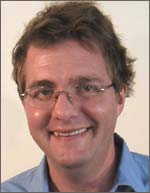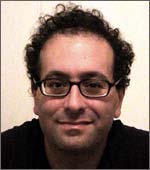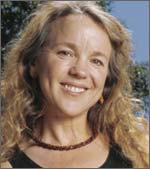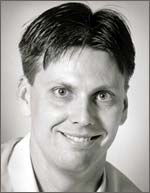UC Berkeley Press Release
White House honors five UC Berkeley researchers for early career achievements
BERKELEY – Five researchers from the University of California, Berkeley, will receive the nation's highest award for scientists at the early stages of their careers at a White House ceremony today (Thursday, Sept. 9).
John H. Marburger III, science advisor to the U.S. President and director of the Office of Science and Technology Policy will award UC Berkeley's Stuart D. Bale, Michael Eisen, Kara Nelson, Kimmen Sjölander and Brian Wirth the 2003 Presidential Early Career Award for Scientists and Engineers (PECASE).
The UC Berkeley honorees are among 57 scientists around the country to receive the prestigious award, initiated in 1996. UC Berkeley has more awardees than any other institution in the country.
 Stuart D. Bale |
Stuart D. Bale, an assistant professor of physics and associate director of UC Berkeley's Space Sciences Laboratory, leads a group that builds satellite instruments to study the interaction of ionized particles from the sun with the Earth's magnetic field. These plasma processes, including magnetic reconnection and collisionless shocks, drive the dynamics of the universe, yet are nearly impossible to study in the laboratory.
Experiments by Bale and his colleagues on the Polar, Wind and Cluster spacecraft have made important new discoveries related to the evolution of magnetic reconnection, which is thought to cause solar flares. He and colleagues currently are building a set of experiments for NASA's STEREO mission to study the generation and evolution of coronal mass ejections, which are enormous solar eruptions whose triggering mechanism, evolution and role in solar physics are largely unknown.
 Michael B. Eisen |
Michael B. Eisen, assistant professor of molecular and cell biology and a scientist at Lawrence Berkeley National Laboratory, is an expert in computational and evolutionary biology who in 2003 co-founded the Public Library of Science (PLoS), a Web-based, open-access scientific and medical publishing venture.
Eisen uses a variety of experimental and computational techniques to study how fungi and animals control the production of the thousands of genes encoded by their genomes, and the role that regulated gene expression plays in specifying an organism's form and function. He is particularly interested in the evolution of the sequences that control gene expression, and in understanding the role that regulatory evolution has played in the diversification of species.
 Kara Nelson |
Kara Nelson, an assistant professor of civil and environmental engineering, conducts innovative research on the use of natural systems - specifically sunlight and oxygen - to treat water contaminated by pathogens, a major public health challenge in much of the world.
Nelson's research on ultraviolet (UV) light and photo-oxidation, both of which lead to cell damage of waterborne pathogens, focuses on processes occurring in natural waterways, such as rivers and lakes, as well as engineered systems, such as wastewater stabilization ponds and constructed wetlands. Her work may eventually lead to better water treatment plant designs and a re-evaluation of water quality standards, particularly in developing countries.
 Kimmen Sjölander |
Kimmen Sjölander, assistant professor of bioengineering and head of UC Berkeley's Phylogenomics Group, is being honored for her work in computational biology to understand the evolution of proteins, the workhorses of all life. She is developing algorithms to unlock the mysteries of how protein superfamilies evolve novel functions and structures, and how evolutionary relationships between proteins help predict structure and function. Her projects, which involve regular collaborations with experimental biologists, include the study of how proteins confer disease resistance in both plants and animals.
She is also a faculty affiliate with the California Institute for Quantitative Biomedical Research (QB3), a faculty scientist at the Lawrence Berkeley National Laboratory and an affiliated assistant professor in UC Berkeley's Department of Plant and Microbial Biology. Before joining UC Berkeley, Sjölander worked at Celera Genomics, where she participated in the functional annotation of the recently sequenced human genome.
 Brian Wirth |
Brian Wirth, assistant professor of nuclear engineering, is receiving his award in recognition of his work in computational modeling and experiments designed to determine the mechanisms responsible for defects in metals, primarily those resulting from irradiation by neutrons and ions. His research is relevant to predicting when nuclear facilities are no longer safe to operate.
Prior to joining UC Berkeley in 2002, Wirth spent four years at Lawrence Livermore National Laboratory, where he carried out computer simulations to study time-dependent damage in a wide variety of metals, including steels, copper, iron, vanadium and plutonium. He notes that the constant bombardment of neutrons weakens the steel pressure vessel surrounding nuclear fuel, making the metal more susceptible to cracking with sudden changes in stress or temperature.
The 57 recipients of the 2003 PECASE award were sponsored by eight different federal agencies. Bale's work is supported by the National Aeronautics and Space Administration, and the National Institutes of Health supports Eisen's research. The National Science Foundation sponsors the research of Nelson and Sjölander, while the Department of Energy supports Wirth's research.
The White House will webcast the event live at 3 p.m. EDT today from the White House Web site at http://www.whitehouse.gov/live.v.ram.

